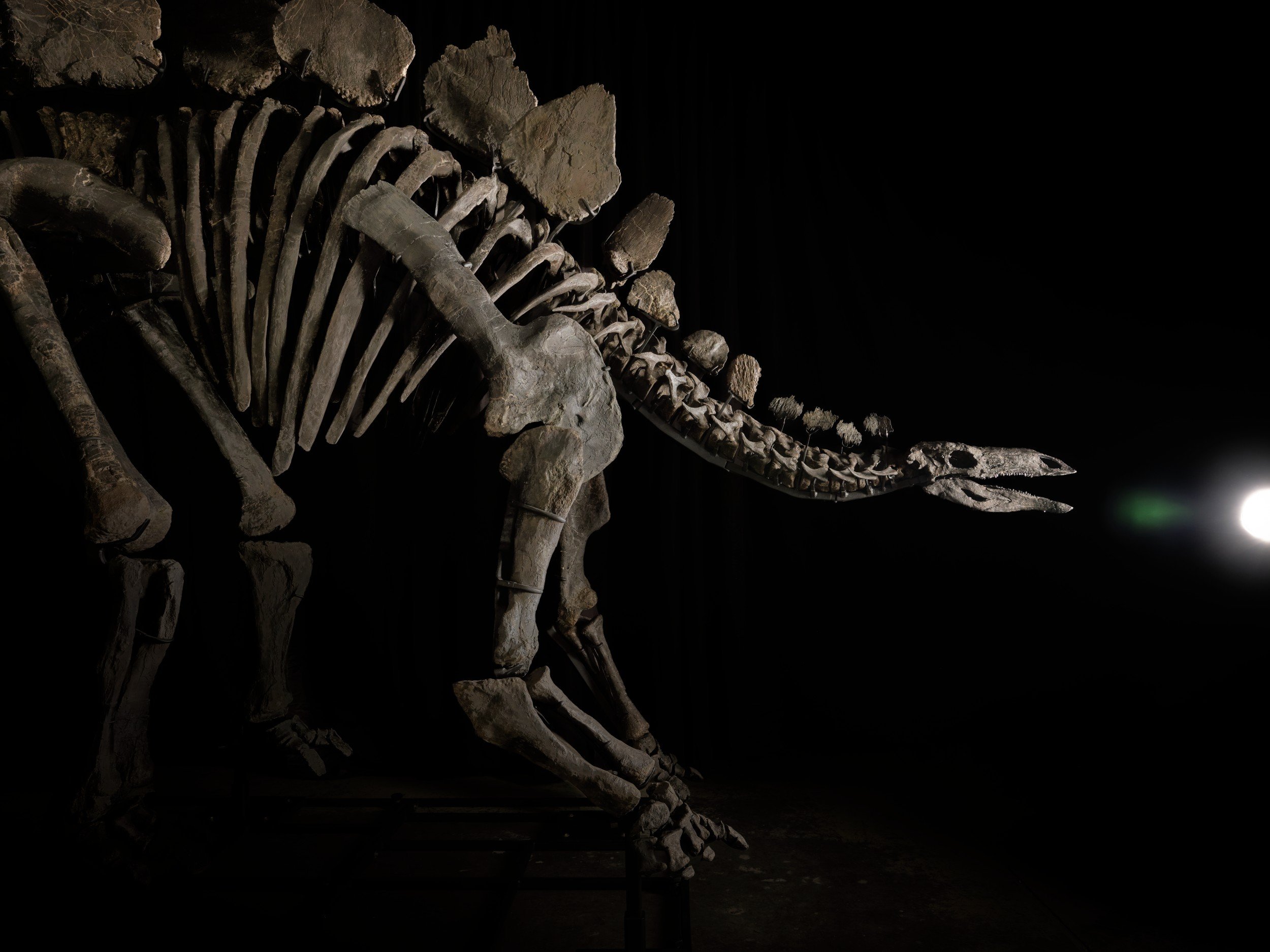
Sotheby’s is hosting a monster of a sale this summer. On July 17, the auction house is offering a virtually complete Stegosaurus skeleton, coming in at 11 feet tall and 20 feet long, and dating to some 150 million years ago. Just as hefty is its estimate—$4 million to $6 million—which, if realized, would make it one of the most valuable dinosaur fossils.
Christened “Apex,” the fossil was uncovered in the Morrison Formation, a rock terrain in Moffat County, Colorado, that has long been the site of numerous Late Jurassic discoveries, including two genera of Stegosaurus. When it was excavated by an unnamed paleontologist in October 2023, the skeleton was immediately remarkable. Its bones displayed no signs of combat-related injuries, with only evidence of arthritis, suggesting that the dinosaur lived to a ripe old age.
Apex, the Stegosaurus skeleton heading to auction at Sotheby’s. Photo: Matthew Sherman, courtesy of Sotheby’s.
A heavily built herbivorous creature, the Stegosaurus is distinguished by a series of kite-shaped plates arrayed on its back and tail, which were likely used for defense and display. The remains of about 80 individual creatures have been found since the first fossil turned up in the late 19th century. But only in the following century did complete Stegosaurus skeletons show up in museums, composited using different specimens.
London’s National History Museum currently holds a comparable Stegosaurus skeleton dubbed “Sophie,” which was excavated in Wyoming in 2003. It is, however, dwarfed by Apex, which is at least 30 percent larger, with a whopping femur length of 45 inches.
According to Sotheby’s, the sale marks the first time an auction house has helped to shepherd a dinosaur specimen from the day of its discovery to its arrival at the auction block. Apex has been prepared and mounted by its owner “to the highest standards,” touted Sotheby’s statement, and each step in the process has been meticulously documented. Whoever snaps up the fossil will receive its scan data and a full license to use it however they choose.
“Through the careful process of excavation, preparation, and installation, Apex sets a new standard for all future discoveries of this magnitude,” said Cassandra Hatton, the house’s global head of science and popular culture, in a statement, “and further reinforces the enduring appeal of Stegosaurus and its vaunted status in popular culture.”
Apex, the Stegosaurus skeleton heading to auction at Sotheby’s. Photo: Matthew Sherman, courtesy of Sotheby’s.
The house has a storied history with dinosaur skeletons. It was the first to bring a fossil to auction with Sue the T.Rex, which fetched $8.3 million in 1997. A Gorgosaurus followed in 2022, raking in $6.1 million, then Maximus, a T.Rex skull, which also fetched $6.1 million. Other fossils have made similarly eye-watering sums, notably Drouot’s Triceratops, which made $7.4 million in 2021, and Christie’s Velociraptor skeleton, a runaway hit that sold for $12.4 million in 2022.
But the sale of prehistoric artifacts is not without its critics, most notably paleontologists, who have decried the practice as turning scientific specimens into luxury items or “toys for the rich.” Speaking to Artnet News in 2022, Hatton defended such auctions, noting that private collectors could play roles in loaning and donating these specimens for academic research.
“Most collectors are at heart passionate about the study and preservation of fossils, and the pleasure of sharing these incredible items with others is common among the community of collectors,” she said.